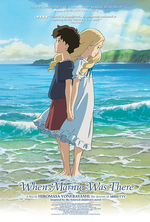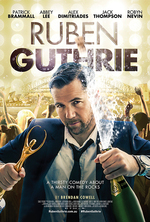Film Screening 17th October, 2015

When Marnie Was There (Omoide no Mânî)
7:00 PM, 17th October, 2015
- PG
- 103 mins
- 2014
- Hiromasa Yonebayashi
- Keiko Niwa, Masashi Ando, Hiromasa Yonebayashi
- Sara Takatsuki, Kasumi Arimura, Nanako Matsushima, Toshie Negishi
The team at Studio Ghibli produces consistently beautiful traditionally animated feature films. Indeed, they won the Academy Award for Best Animated Film for Spirited Away in 2001, and have been on a creative roll ever since. But with the recent retirement of studio founder Hayao Miyazaki, Studio Ghibli’s fate has been up in the air.
Their latest (and possibly last) animated film is When Marnie Was There, based upon the 1969 young adult novel of the same name by British author Joan G. Robinson. The movie translocates the action to modern-day Japan, but is otherwise faithful to the novel’s plot and themes.
12-year-old Anna attends school in one of Japan’s big cities. She is extremely introverted, so lacks any school friends, and is also extremely depressed, in part because she has discovered that she is a foster child. Furthermore, her psychological state leads to asthma attacks. Anna’s foster mother therefore decides to send her on a country holiday, to the farm of Anna’s foster uncle and foster aunt. The rural setting causes Anna to gradually blossom and make her first real friend in a mysterious girl named Marnie.
This movie is somewhat slower than the frenetic pace of some other animated movies (such as Minions, for example, also screening this semester), but is richer and has more depth. An important note: the ending will bring tears to your eyes, so you may wish to bring a box of tissues.
Richard Hills

Ruben Guthrie
8:53 PM, 17th October, 2015
- MA
- 93 mins
- 2015
- Brendan Cowell
- Brendan Cowell
- Patrick Brammall, Abbey Lee, Alex Dimitriades, Jack Thompson
Ruben (Brammall, bearing a strong physical resemblance to writer-director Cowell) is an advertising wonder boy – a hotshot creative director engaged to a Czech supermodel, and a wild party boy by night, until one night the partying gets too much and he nearly kills himself.
Newly in recovery in Alcoholics Anonymous, he starts to face the glittering, gaudy world around him sober – and the question becomes whether he can really survive the world around him, and whether the world and people around him can actually stand him when he’s sober.
A pitch-black comedy about the deep dark truths that underlie the lives of the beautiful and shallow, Ruben Guthrie asks whether change is really possible, and parodies both the mantra-like simplicities of the recovery movement and the temptations towards inebriation that lie in wait.
Dare one say, it’s an intoxicating ride with debauchery, intense drama and hilarious comedy smashing up against one another in an irresistible cocktail. Come on, you know you want a sip…
Simon Tolhurst